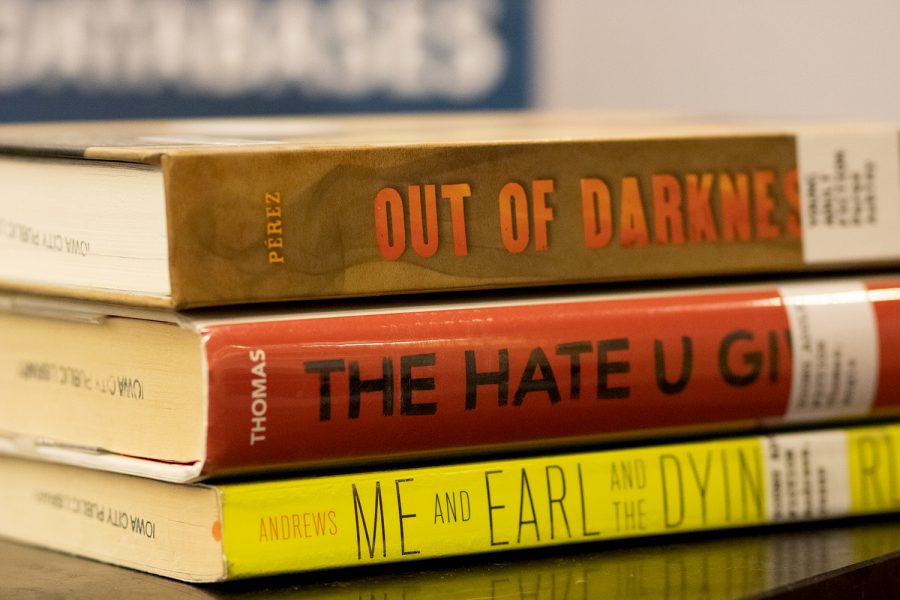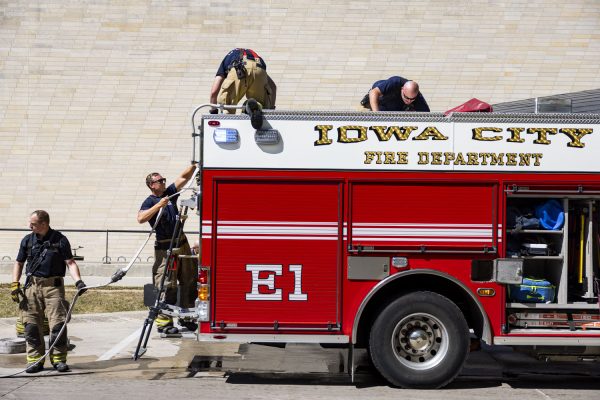Iowa City reacts to new legislation that would ban books in schools K-12
This bill would require every school district to post online a list of all books in the schools’ libraries, and be subject to judgment by parents.
Photo illustration.
April 9, 2023
Iowa City has been a go-to location for renowned authors as an UNESCO City of Literature, but a new book-banning bill proposed by the Iowa Legislature may restrict some books from landing in Iowa City Community School District libraries.
The initial piece of legislation was introduced on Feb. 9 and gives parents more authority over what books are allowed in their school library. The legislation later became Senate File 496 and passed by a 55-42 vote in the Iowa House. It heads to the Iowa Senate to be reconsidered after being amended in the Iowa House.
John Kenyon, the executive director of Iowa City UNESCO City of Literature, said he feels the bill is pushing other people’s beliefs onto students.
“It’s disappointing. I’ve talked with colleagues from around the world about this, and they’re shocked,” Kenyon said. “It’s not the sort of thing that one expects from the U.S.”
According to the legislation, school districts would have to post all books in the school libraries and classrooms online, along with the process for parents to take books out of the libraries. Once a book is removed, it is then put on a statewide removal list maintained by the Iowa Department of Education.
Books that have been successfully removed from Iowa schools, according to PEN America:
- “The Absolutely True Diary of a Part-Time Indian” by Sherman Alexie
- “Me, Earl and the Dying Girl” by Alfonso Gomez-Rejon
- “Gender Queer” by Maia Kobabe
The most recent addition to this list is “This Book Is Gay,” by Juno Dawson, which was removed from school libraries in the Iowa City Community School District earlier this month.
Kenyon assures this bill won’t affect Iowa City’s UNESCO designation. However, he believes it will make it more difficult for the organization to do its job.
“One of the things that we consider when cities are looking to apply for designation in our network is their freedom of expression,” he said.
He said that other factors include freedom of the press, the availability of materials, and the treatment of education opportunities.
RELATED: Iowa City Community School District to remove controversial book following bomb threats
Because of his position, Kenyon can interact with students in the community. He has recently been seeing an uptick in the number of teenagers and young adults that have intentions of leaving the state because of legislation like this.
Instead of trying to make Iowa look more attractive, he said he feels the state is actively pushing away its best and brightest.
“If you look at the types of books that are being targeted, they are books that speak to the experience of people of color and LGBTQ+ individuals,” he said.
Kenyon said this bill allows parents to dictate what other people’s children have access to.
Sam Helmick, Iowa City Public Library community and access services coordinator, said they believe this bill gives select parents more control over other parents’ children’s decisions.
Helmick serves as the Iowa Libraries Association president and has been invited to the Iowa legislation space multiple times during the discussion of the bill. They feel more access to books is the solution.
Helmick believes this bill will affect the Iowa City Public Library culturally and socially and is also concerned with the relationship the students hold with their public library.
“If parents don’t feel they have influence over their children beyond school, and now school is telling you not to access information and explore or expect privacy out of your library, what kind of library users are we educating here,” Helmick said.
Helmick feels the students and parents are getting a different message on the value of libraries, which is to serve citizens.
“It begins by targeting marginalized groups, and then it continues to expand, and I’m holding my breath knowing more are to come,” they said.
Helmick said this bill fails to define what an objection or challenging process is for books. They said that the lack of clarity makes this easier to weaponize both ideologically and commercially.
“When you make the process more difficult, not only does it change the way you as a user of the library explore the world around you and use the resources that should be available to you as a modern Iowan, but it also chips away at the foundation of what libraries are,” they said.
For Helmick, the one tool that has always created equity for democracy is information and access to spaces that allow people with different backgrounds and beliefs to come together and have conversations.
Prairie Lights Books & Café owner Jan Weissmiller said it is against citizens’ First Amendment rights to ban books.
“I don’t understand an interpretation of the constitution that would make [banning books] legal,” Weissmiller said.
Weissmiller assured that Prairie Lights will always stock books that aren’t made available in schools because of the bill.
She added that the store is planning on putting up a permanent display of banned books.
“If high school kids are unable to get books in their schools, they will be able to get them here,” she said.















